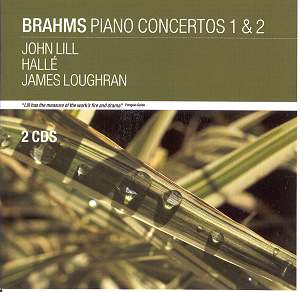Oh dear, Resonance
are getting really good at Brahms cycles
which are very fine in parts and unrecommendable
in others Ė see my review
of the Liverpool/Janowski set of
the symphonies.
At the start of no.1
I thought the Hallé strings seemed
remarkably few, though no fewer than
those Brahmsís favourite Meiningen Orchestra.
The resulting clarity and forward wind
may sound more "authentic" today than
people thought when it was first issued.
Whatís more, I very much appreciated
Loughranís lean, muscular style, forwardly-moving
and classical. So many performances
today drag out this movement. There
is a slight slackening for the contrasting
material but without steering into the
doldrums. When Lill enters we can hear
that the approach is his as much as
the conductorís. He doesnít go in for
massive sonorities or barnstorming virtuosity,
but his textures are beautifully clean
while his excellent legato prevents
any suggestion of dryness. In its conversational
qualities, in its sense of moderation,
I thought this very close to Brahmsís
own language.
And so, too, with the
slow movement which, while grave, is
allowed to flow. The finale, at a fairly
moderate pace, has both purpose, character
and vitality.
Now I admit that some
listeners may find this unchallenging.
Iím prepared to defend it by saying
that performances that go all out for
drama, or massiveness, or heaven-storming,
or whatever, often lose out on other
things along the way. As a corrective
to exaggeration, I shall keep this by
me.
After the flowing tempi
of no.1 my first problem with the first
movement of no.2 was the very slow tempo.
As the horn started I thought this was
going to be one of those performances
that play this theme much slower than
the rest of the movement, as a sort
of motto-theme. But no, it is held pretty
steady right through. Joyce Hattoís
version raised a few eyebrows in this
respect (Lill is a few seconds longer
still) and both I and my colleague Jonathan
Woolf felt that it worked fine when
she was playing but created some problems
for the orchestra. Now I must say that,
with Loughran at the helm, thereís no
problem about the orchestra. Again he
essays a lean style with clean textures
and alert rhythms, while not ignoring
the more romantic parts. Lill, once
again, is clean and unsensational. At
first I quite liked it, but gradually
I felt it wasnít adding up. Given a
listless scherzo, in which the orchestra
sounds unengaged and less accurate than
usual, a wishy-washy slow movement and
a joyless finale, I am bound to ask,
why?
The point is, perhaps,
that the first concerto is an early
work. It impresses by its classical
rigour and single-mindedness, qualities
which Lill and Loughran grasp well.
The second is a late work, infinitely
more varied, more challenging in its
climaxes, more ardent in its long romantic
themes, but also bubbling with humour
and joi-de-vivre in its Hungarian
finale. Brahms has changed and developed,
but Lill and Loughran seem unaware of
it. In view of the excellent symphony
cycle by Loughran, Iím reluctant to
blame him too much, though. What passed
as rigorous and well-balanced in no.
1 makes no. 2 sound as if it were written
by Parry on an off-day. Itís certainly
one way of reminding yourself of what
a range of mood there is in this work,
to hear it played by someone who apparently
hasnít noticed, but youíd hardly want
to get the record just for that.
No, no.1 would get
a recommendation on its own but in tandem,
no way. If the famous Gilels/Jochum
performances are available - they havenít
often been out of the catalogue - youíll
get the op.116 pieces into the bargain.
And, if you donít mind old sound, thereís
a lot to be learnt from Schnabel on
Naxos.
Christopher Howell


